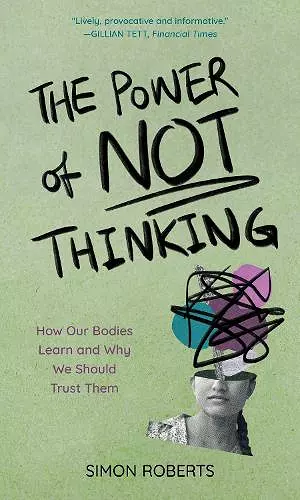The Power of Not Thinking
How Our Bodies Learn and Why We Should Trust Them
Format:Hardback
Publisher:Bloomsbury Publishing PLC
Published:12th Sep '22
Currently unavailable, and unfortunately no date known when it will be back

Drawing upon an incredible range of cutting-edge science, real-life examples, and personal experience, Simon Roberts explores the complexity of even the simplest of tasks that humans perform every day and explains how, with a greater awareness of the processes at work, we can tap into our full potential and excel in any area of our lives.
Details the role our body plays in how we learn and how we can tap into our body’s knowledge to excel in all facets of life.
Ask someone to point to the part of their body responsible for their intelligence and it is highly likely that they will point at their head. This assumption is understandable, given that, for centuries, from Descartes’ “cogito ergo sum” to the computer age, this is what we have been told to think.
And yet we all share common experiences that have revealed the incomparable power of “not thinking”. Have you ever struggled to remember your pin number only to hold your fingers out and type it correctly with your hands, played the piano without focusing on remembering the correct notes or listened to your gut feeling when under the pressure of a big decision? All these instances prove that it is time to stop neglecting the role the body plays in our acquisition of knowledge and to explore how it is that brain and body combine to deliver what we view as uniquely human intelligence. You never forgot how to ride a bike did you?
In this unique new book, social and business anthropologist Simon Roberts looks at the pivotal role that our body plays in how we learn and reminds us of why we should learn to listen to it more often. Drawing upon an incredible range of cutting-edge science, real-life examples and personal experience, Roberts explores the complexity of even the simplest of tasks that humans perform every day and goes on to explain how, with a greater awareness of the processes at work, we can tap into our full potential and excel in any area of our lives.
His proposition isn’t the antidote to big data, cold rationalism, and reductionism. But, as embodied knowledge emerges from our engagement and interaction with the world, the author underlines why...
Roberts, a British researcher and business anthropologist, explores how the body contributes to learning, including observation through senses, understanding others by replicating their movements, and repeating actions until they become part of the unconscious. In a world increasingly reliant on data, surveys, and studies, Roberts proposes stepping away from computers and immersing researchers in people's actual environments, using this firsthand physical data to design products, make policy decisions, and spark creativity… [M]any of his conclusions are fascinating and present a convincing argument for listening to our body and appreciating its essential contributions. * Booklist *
Embodied habits matter deeply, as illustrated powerfully in Roberts' timely new book. -- Financial Times
A lovely account that explains why executives, financiers, policy makers (and everybody else) needs to embrace walking in someone else's shoes. -- The Guardian
Roberts shows us that our bodies, as well as our minds, have a vital role to play in the contribution that human beings make. -- Stefan Stern, How to be a Better Leader
This book is as timely as it is important. Bodies have always mattered but it takes a voice as clear as Simon Roberts to remind us of just how very much, and why embodiment should be a critical part of all our conversations about the future. -- Genevieve Bell, Distinguished Professor, director, School of Cybernetics, The Australian National University
Has the potential to change the way you think about understanding people -- Martha Cotton, Fjord/Accenture
Business anthropologist Simon Roberts details how human intelligence includes “embodied” knowledge –something AI has not yet succeeded in replicating. Embodied knowledge derives from the body – through movement, muscle memory, sight, hearing, taste, smell and touch. It includes experiences that evoke deep sensory memories that permit action without thought and pattern recognition. These embedded memories enable you to feel, rather than merely reason, your way through many decisions. Roberts provides innovative examples of companies making better decisions by pairing data with experiential learning. * getAbstract *
ISBN: 9781538167755
Dimensions: 236mm x 158mm x 27mm
Weight: 621g
336 pages